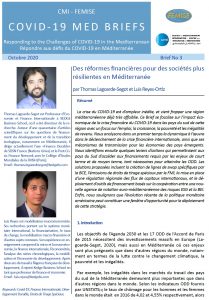
The recent coronavirus crisis threatens the health, economies and societies of all countries. In Southern and Eastern Mediterranean countries, the fight against the pandemic is even more complicated. Cooperation and EU-Med strategies in key sectors are needed. Therefore, the Center for Mediterranean Integration (CMI) and FEMISE join forces and launch their joint series of Policy Briefs called “COVID-19 MED BRIEFS” to pave the way for thematic analyses and policy relevant recommendations.
 The third COVID-19 MED BRIEF, entitled “Financial reforms for more Resilient Societies in the Mediterranean″ by Thomas Lagoarde-Segot et Luis Reyes-Ortiz, is available here (in french)
The third COVID-19 MED BRIEF, entitled “Financial reforms for more Resilient Societies in the Mediterranean″ by Thomas Lagoarde-Segot et Luis Reyes-Ortiz, is available here (in french)
Summary : The COVID-19 crisis is unprecedented, and is hitting the Mediterranean region that is already weakened. This Brief focuses on the economic impact of the financial crisis of COVID-19 on the Southern countries of this region with a focus on employment, growth, poverty and inequalities of income.
We first analyse the dynamics at hand in the onset of the international financial crisis, as well as its transmission mechanisms for the economies of emerging countries. We then identify some levers of action that would allow Southern countries to access the funding required at the short term and medium term, which are necessary to achieve the SDGs.
The proposed solutions include the creation of specific swap lines by the ECB, the issuance of special drawing rights by the IMF, the establishment of regional regulations for the international capital flows, and the deployment of funding tools based on the cooperation between a new Euro-Mediterranean ESG risk rating agency and the EIB. Finally, we note that recent developments in the US monetary policy can be a window of opportunity for the deployment of this strategy.
This Policy Brief is produced as part of the series of Policy Briefs on « Responding to the Challenges of COVID-19 in the Mediterranean » that is undertaken in partnership between FEMISE and the Center for Mediterranean Integration (CMI).
The views expressed in this Brief are those of the authors and do not reflect the views of CMI or FEMISE. The contents have not been subjected to verification by CMI or FEMISE and their publication does not reflect ownership by CMI or FEMISE.


